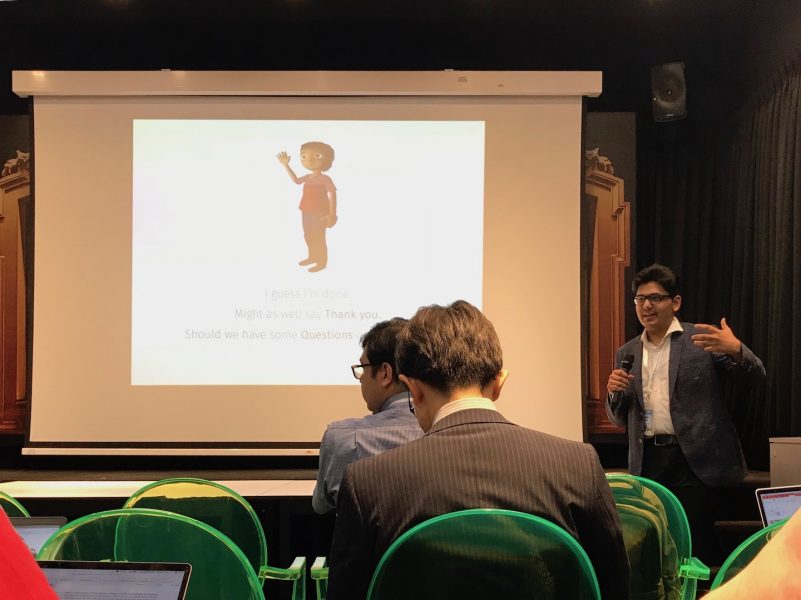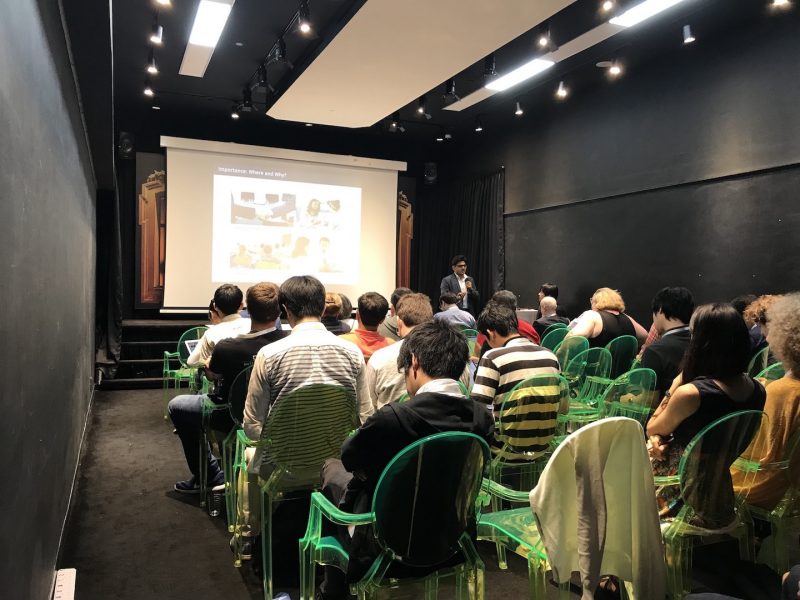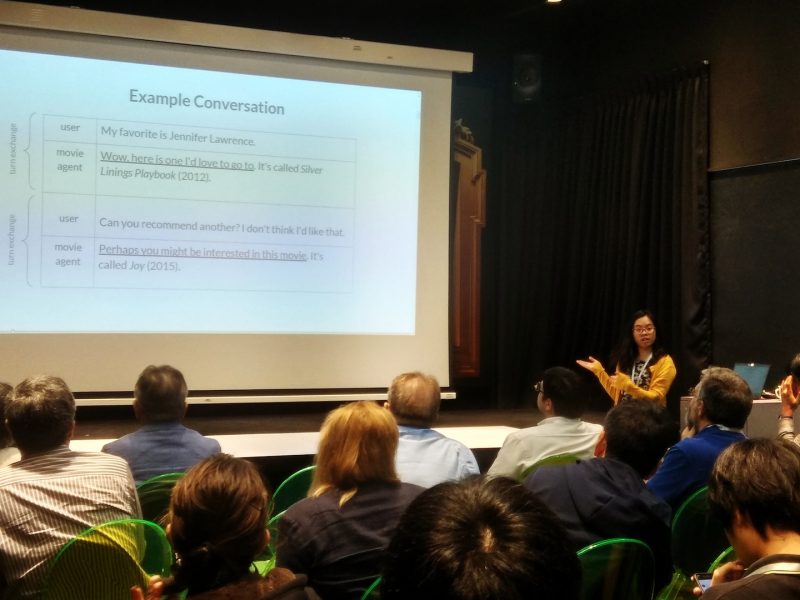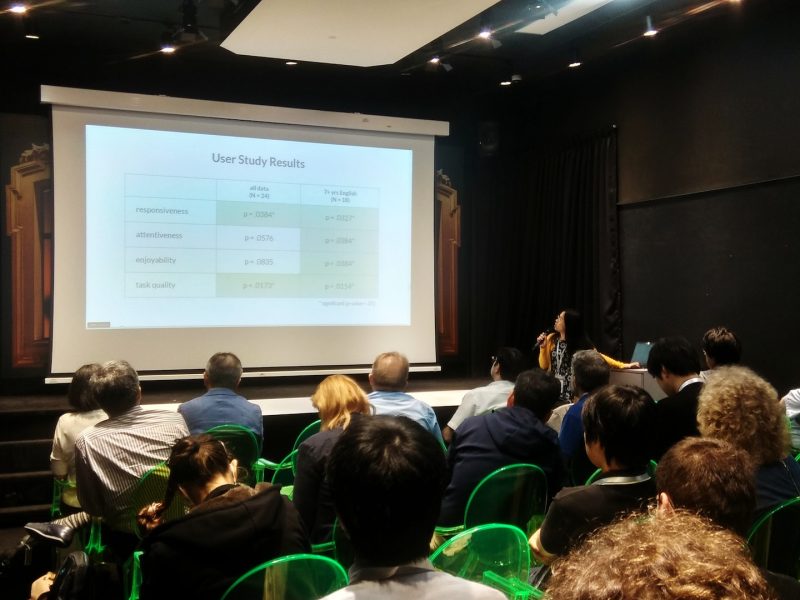Summer Interns Presented Their Work in IWSDS 2018!
2018.May.16:
Pranav Goel (Senior, Indian Institute of Technology (BHU) Varanasi) and Vivian Tsai (Sophomore, Johns Hopkins University), ArticuLab summer SARA/InMind interns of 2017, presented their work at the Workshop on Spoken Dialogue Systems Technology (IWSDS 2018)! Great work, Pranav and Vivian!
- “I think it might help if we multiply, and not add”: Detecting Indirectness in Conversation
Pranav Goel, Yoichi Matsuyama, Michael Madaio and Justine Cassell- Abstract: The strategic use of indirect language is crucial in business negotiations, doctor-patient interactions, instructional discourse and multiple other contexts. Being indirect allows interlocutors to diminish the potential threats to their interlocutors’ desired self image – or, face threat – that may arise by being overtly direct. Handling indirectness well is important for spoken dialogue systems, as being either too indirect or too direct at the wrong time could be harmful to the agent-user relationship. We take a step towards handling users’ indirection by exploring the task of automatically detecting indirectness in conversations, exploring different supervised machine learning approaches, and ultimately achieving a 62% F1 score on our dataset. Deep neural network based approaches perform significantly better than their non-neural counterparts, which may indicate the nuanced and complex nature of indirectness. To our knowledge we are the first to use a multi-modal approach to detecting indirect language: we rely on both verbal and nonverbal features of the interaction. Accurate automated detection of indirectness may help conversational agents better understand their users’ intents, gauge the current relationship with the user in order to appropriately plan a response, and inform the strategic use of indirectness to manage the task goals and social goals of the interaction.
- Faster Responses are Better Responses: Introducing Incrementality into Sociable Virtual Personal Assistants
Vivian Tsai, Timo Baumann, Florian Pecune and Justine Cassell- Abstract: Speech-based interactive systems, such as virtual personal assistants, inevitably use complex architectures, with a multitude of modules working in series (or less often in parallel) to perform a task (e.g., giving personalized movie recommendations via dialog). Add modules for evoking and sustaining sociability with the user and the accumulation of processing latencies through the modules results in considerable turn-taking delays. We introduce incremental speech processing into the generation pipeline of the system to overcome this challenge with only minimal changes to the system architecture, through partial underspecification that is resolved as necessary. A user study with a sociable movie recommendation agent objectively diminishes turn-taking delays; furthermore, users not only rate the incremental system as more responsive, but also rate its recommendation performance as higher.

Pranav Goel

Pranav Goel

Vivian Tsai

Vivian Tsai

Pranav Goel is an undergrad student at Indian Institute of Technology, Varanasi, India. His major is Computer Science and his area of research interest lies at the intersection of Natural Language Processing and Machine Learning. He is highly enthused by the recent advances in Deep Learning and is absolutely loving the chance to apply it during his internship at ArticuLab, working on the SARA project. Outside research, he loves following and playing sports like soccer and badminton, reading sci-fi and detective fiction novels and watching live-action or animated superhero themed stuff.
 Vivian Tsai studies computer science and applied math at Johns Hopkins University, with particular interests in natural language processing and discrete math. Her accomplishments include playing the piano, blurting random snippets of literature, and seeing all 51 U.S. license plates firsthand. She is excited to return to the ArticuLab, where she previously worked on the InMind project, raised two plants, and unwittingly memorized a surprising number of movie release years.
Vivian Tsai studies computer science and applied math at Johns Hopkins University, with particular interests in natural language processing and discrete math. Her accomplishments include playing the piano, blurting random snippets of literature, and seeing all 51 U.S. license plates firsthand. She is excited to return to the ArticuLab, where she previously worked on the InMind project, raised two plants, and unwittingly memorized a surprising number of movie release years.
- January 2025
- May 2024
- February 2024
- August 2023
- September 2022
- March 2022
- September 2018
- August 2018
- July 2018
- June 2018
- May 2018
- April 2018
- March 2018
- February 2018
- November 2017
- October 2017
- August 2017
- July 2017
- June 2017
- May 2017
- March 2017
- February 2017
- January 2017
- October 2016
- September 2016
- August 2016





